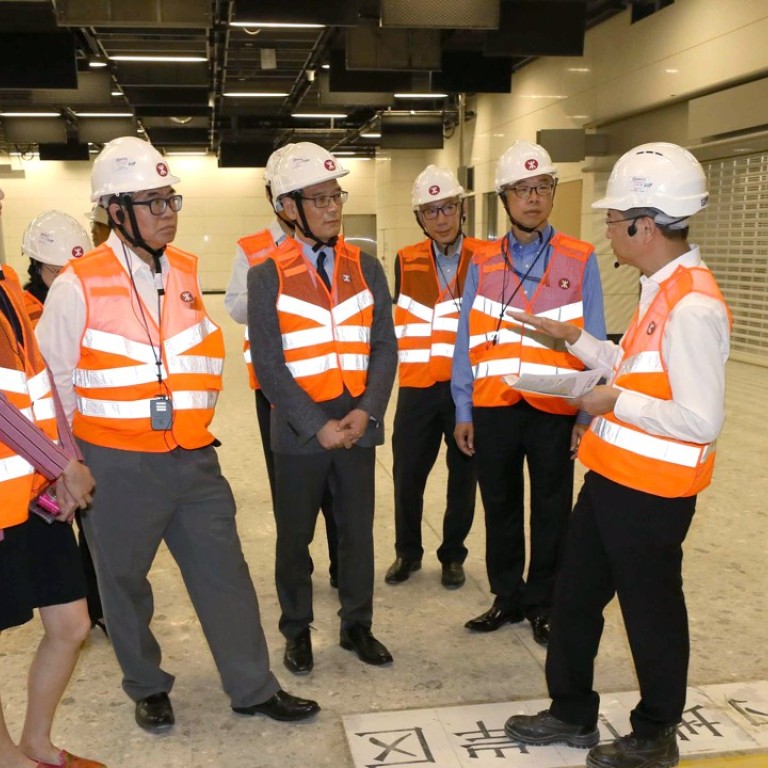
Hong Kong opposition lawmakers propose raft of amendments to stall high-speed rail link
Legislators submit 30 changes to law on controversial cross-border checkpoint but panel chief confident of closure by Monday
Three days before the deadline for lawmakers to complete their scrutiny of the controversial joint checkpoint plan for Hong Kong’s cross-border rail link to Guangzhou, the opposition camp has proposed some 30 amendments to delay the passage of the bill.
“The bill is unconstitutional. We raise the amendments to highlight the problems,” Civic Party lawmaker Tanya Chan said on Friday.
Claudia Mo Man-ching of Council Front said: “Even though we know the amendments would hardly get passed … we will do as much as we can to show the absurdity of the bill.”
But the pan-democratic camp’s latest attempt to stall an arrangement they have long opposed did little to deter bills committee chairwoman Regina Ip Lau Suk-yee. Ip, who is also a member of Chief Executive Carrie Lam Cheng Yuet-ngor’s cabinet, said she aimed to close the discussion by Monday.
Hong Kong opposition lawmaker Ted Hui snatches woman’s phone and dashes into men’s toilet – but later apologises
Ip set the deadline of May 7 after the government reminded her last month that the committee, which began looking at the bill on February 12, should complete its task by mid-May. This was because bills must be scrutinised within three months under Legislative Council house rules.
If the bills committee wraps up its work on time, the government can present the legislation to the full chamber for a vote by the end of this month, allowing the Guangzhou-Shenzhen-Hong Kong Express Rail Link to begin operating in September as planned.

Transport minister Frank Chan Fan said on Saturday that he hoped lawmakers could handle the bill in a rational manner, and that he found the amendments irrelevant.
“I very much hope that the draft bill would be passed by early next week,” Chan said. “But I fully appreciate the number of amendments being tabled by fellow members of the legislature. It basically showed their will and opinions.”
The so-called co-location arrangement would see national laws enforced in part of the West Kowloon terminus in Hong Kong. The section would be leased out to mainland Chinese authorities.
Pan-democrats and some legal experts have said the plan contravened the Basic Law, the city’s mini-constitution.
This was also why 64 out of 68 lawmakers decided to join the panel to scrutinise the bill, when usually only about 10 lawmakers are involved at the bills committee stage.
Trip on cosy high-speed train will not sway us over contentious joint checkpoint plan, say Hong Kong opposition lawmakers
On Friday, about 30 amendments were tabled by eight lawmakers, relating to various fields from restricting the power of mainland officials to the commencement date of the new rail line.
Chan proposed an amendment to confine mainland jurisdiction to mere customs duties, immigration and quarantine control.
She added clauses to stipulate that if any Hong Kong permanent residents were arrested by mainland officers, they must notify and cooperate with local immigration officers.
In Mo’s amendment, she changed the operation day set in a clause to “the 365th day after the day on which the Legislative Council approved this ordinance”.
Her amendment was an effort to block the plan being commenced on schedule – the end of September this year.
Au Nok-hin and Fernando Cheung Chiu-hung both added a sunset clause to make the ordinance expire at midnight on June 30, 2047 – when guarantees that a “capitalist system and way of life shall remain unchanged for 50 years” enshrined in the Basic Law expire.
In unprecedented move, May 7 deadline set for Legco bills committee to scrutinise controversial joint checkpoint plan
The bills committee is expected to continue its scrutiny on Saturday and Monday – 12 hours in total.
Ip said she was confident it could be wrapped up by Monday evening.
Regarding the amendments, she said the change of commencement date was clearly unacceptable by the government, while some amendments involving wording appeared to be “subjective”.
“I will reserve my judgment until I have heard all views,” she said, adding that she would meet lawmakers who raised the amendments and government officials for further discussion.

